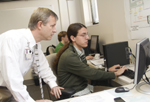|
By Cindy
Abole
Public Relations
In addition to
computer science students Edward
Pharr and Chad Freeman attending
lectures to learn the latest about
software engineering processes,
the interns also are spending time
outside of the classroom working
at MUSC.
Since June,
these College of Charleston (CofC)
students have been busy
translating knowledge and theory
in the classroom. They will then
apply it toward finding real-world
computer solutions to hospital
computer network systems and
projects. Together, they're
learning how to collaborate with
end users and develop best
practices to help MUSC achieve its
information technology strategies.
The effort is
part of a partnership established
between MUSC's Office of the Chief
Information Officer (OCIO) and
CofC's Computer Science
Department. The collaboration will
allow students and staff to share
knowledge and experiences between
the institutions, according to
Frank Clark, Ph.D., vice president
for information technology and
chief information officer.
Pharr and
Freeman began working full-time in
June and will continue to work
part-time during the academic year
as part of a yearlong paid
internship experience.
 OCIO IT Enterprise
Architecture director Mark
Daniels, left, confers with
computer science intern Chad
Freeman as Edward Pharr works in
the background. OCIO IT Enterprise
Architecture director Mark
Daniels, left, confers with
computer science intern Chad
Freeman as Edward Pharr works in
the background.
"This program
allows senior-level computer
science students the chance to
match their classroom-based
knowledge of programming and
theory with valuable workplace
experience. It's a win-win effort
for both the students and our
institutions," said Clark. Both
students will work on projects
that support policies and
practices associated with the
National Health Information
Network that ensures the exchange
of secure health information using
the Internet.
According to
the college's Discovery
Informatics Program director and
department chair Christopher
Starr, Ph.D., the department works
with 68 industry partners,
including MUSC, to sponsor student
interns. CofC's Computing in the
Arts degree program has catalyzed
the establishment of a partnership
with MUSC to provide a way to
increase the college's engagement
in collaborative software projects
for the public and market.
According to
Starr, MUSC as a partner has been
valuable for students because of
the applications of computer
science in medicine as well as
research and clinical projects
that include software development.
"We view MUSC
as a creative partner, ready to
participate with us in research,
invention and now entrepreneurship
in medical software markets. MUSC
also has highly-skilled software
developers on staff that mentor
our students, validating what they
learn at CofC and adding new
value."
Both students
work under the direction of
internship mentor Mark Daniels,
OCIO director of Enterprise
Information Technology (IT)
Architecture. Daniels and his team
initiated technical training and
orientation to health care IT.
They focused on helping the
students understand the
complexities of building and
managing organizational technology
infrastructures within the state's
only academic medical center.
Later, each was assigned to work
with a project resulting in the
design, execution and
documentation of a workplace
solution.
Freeman was
assigned to work on a web portal
application project that would
allow referring physicians to
access to computer information and
electronic medical records that is
encounter-specific. The goal was
to do this without creating a new
application that must be installed
on the remote computer and that
can be accessed using mobile
devices.
Pharr, a
graduate student, was assigned to
upgrade a physician-resident
communications hands-off project
that focused on allowing residents
to leave notes for each other
using mobile devices. The previous
version would use simple files for
storage and had synchronization
issues when multiple physicians
made changes simultaneously. This
project resulted in Pharr
exploring how information was
stored.
Transitioning
theories and experiences from
classroom to workplace has been
both easy and challenging,
according to Freeman. "At MUSC,
we're focusing on creating
products and programs that people
can use. We're dedicated to
analyzing, making adjustments and
testing things so it can work
better. It's different than a
professor teaching it in the
classroom using a step-by-step
process."
The experience
has been positive for both
students. Before starting the
internship, neither student had
seriously considered a career in
medical or health care IT. Today,
they find it a fast-paced and
ever-changing environment driven
by medicine's production of
cutting-edge products, devices and
methods. The students also enjoy
the continuous, open collaboration
between physicians, clinicians and
technical staff.
Both Freeman
and Pharr would consider this
experience as a possible long-term
career.
Freeman said
what he has enjoyed is the ability
to create, design and test
applicable products. "I can't say
how much more accomplished I feel
as a developer and programmer than
what I've experienced in the past
three months. MUSC is a great
environment to be part of where
people of different skills are
dedicated to helping patients feel
better and finding solutions that
positively affect their health
outcomes."
|



 OCIO IT Enterprise
Architecture director Mark
Daniels, left, confers with
computer science intern Chad
Freeman as Edward Pharr works in
the background.
OCIO IT Enterprise
Architecture director Mark
Daniels, left, confers with
computer science intern Chad
Freeman as Edward Pharr works in
the background.